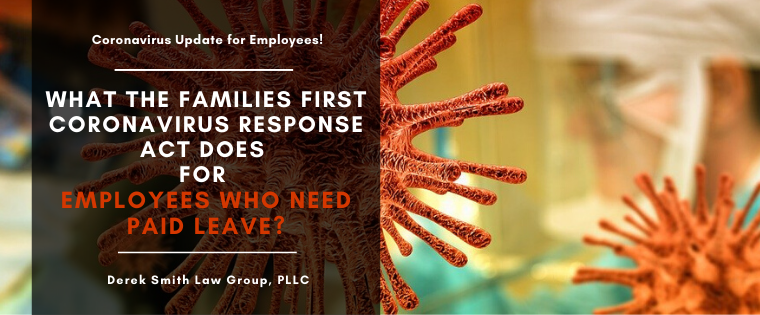The Families First Coronavirus Response Act forces most employers to offer sick pay and extend FMLA benefits to employees affected by Coronavirus.
Congress passed two new laws under the Families First Coronavirus Response Act (FFCRA). The FFCRA provides employees with paid sick leave through two new laws. This is the first time the Federal Government has required private employers to provide paid sick leave for employees:
1. The Emergency Paid Sick Leave Act (EPSLA) – This one is more expansive, covers more situations, and pays more money. It works only in the short term for a maximum of 2 weeks.
2.The Emergency Family and Medical Leave Expansion Act (EFMLEA) – This one covers fewer situations, pays less, but can last as long as 10 weeks.
Employees in firms with less than 500 people will receive paid time off and extended FMLA benefits if affected by Coronavirus. The laws go into effect on April 2, 2020, and stay in effect through December 31, 2020.
Who Qualifies for Paid Leave Under the New Coronavirus Laws?
Under the laws above, employers with under 500 employees must offer coverage to qualifying employees. Employers do not lose. The Federal Government will reimburse them in the form of payroll tax credits. This situation is a win-win for employers and employees.
Firstly, we have the EPSLA which covers any employee who has worked for a company for just one (1) day or more. The employee must not be able to work for one of the following reasons:
- The employee is subject to a quarantine or isolation order
- A healthcare provider advises the employee to self-quarantine for any related illness
- The employee has symptoms of COVID-19 and is seeking a diagnosis
- The employee is caring for a person (family or non-family member) under quarantine/isolation order or advised by a healthcare provider to self-quarantine
- The employee is caring for a child because the school or daycare is closed
Secondly, we have the EFMLEA, which covers any employee who has worked for a company for 30 days or more. The employee must not be able to work for only the following reason:
- The EFMLEA ONLY applies to an employee who cannot work (whether remotely or onsite) in order to care for a child whose school or daycare is closed. (contrast this with the EPSLA above which allows several other reasons for leave). The trigger is that the employee cannot work because they need to take care of their child whose school or daycare has closed.
What Benefits Are Available Under The Emergency Paid Sick Leave Act?
Under the EPSLA, employees working for employees with less than 500 employees may receive up to 80 hours (2weeks) of paid sick leave.
How much money per day is determined by the reason for the leave?
- The maximum an employer must pay is $511 per day up to 10 days if the employee is a) subject to a quarantine or isolation order; b) a healthcare provider advised the employee to self-quarantine; or c) the employee has symptoms of COVID-19 and is seeking a diagnosis.
- However, the amount is reduced to a maximum of $200 per day for a maximum of 10 days if the reason is because the employee is a) caring for a person under quarantine/isolation order or advised by a healthcare provider to self-quarantine; or b) the employee is caring for a child because the school or daycare is closed.
- An employer may not retaliate against the employee for taking such leave or complaining about not being allowed to take such leave.
What Benefits Are Available Under The Emergency Family and Medical Leave Expansion Act?
Under the Emergency Family and Medical Leave Expansion Act (EFMLEA), employees working for employees with less than 500 employees may receive as follows:
- The first ten days of leave are unpaid
- After the first ten unpaid days, the employee is entitled to 2/3 of their pay up to a maximum of $200 per day up to a maximum of $10,000 (10 weeks).
- After the leave, the employer must restore the employee to their position or an equivalent position when they return. However, if the employer has less than 25 employees, the employer does not have to take the employee back if the employee’s job has been eliminated due to the coronavirus economic crisis. If the position opens up within a year, the employer must first offer the employee their job back.
The purpose of these laws is to ease the economic burden of shutdowns. As the government attempts to curb additional infections and fatalities, many businesses and schools are asked to close their doors. Therefore, employees can self-quarantine and stay healthy. The Families First Coronavirus Relief Act will help these employees make up for lost income during these unprecedented times.
Has your company closed their doors? Are you caring for your young children while their schools or daycares are closed? Are you worried about how you will pay your bills while you are recovering from Covid-19?
The dedicated employment law attorneys at the Derek Smith Law Group are working hard to help you understand your rights during the Coronavirus Outbreak. If you want to learn more about the Families First Coronavirus Response Act or other laws that affect your employee rights during this time, contact us at (800) 807-2209 for a free consultation. We never collect any payments until you win your case.
We want to hear what you think about this article. If you have any questions feel free to contact us. We will gladly answer any questions about the content in this article and your employment law related concerns.

